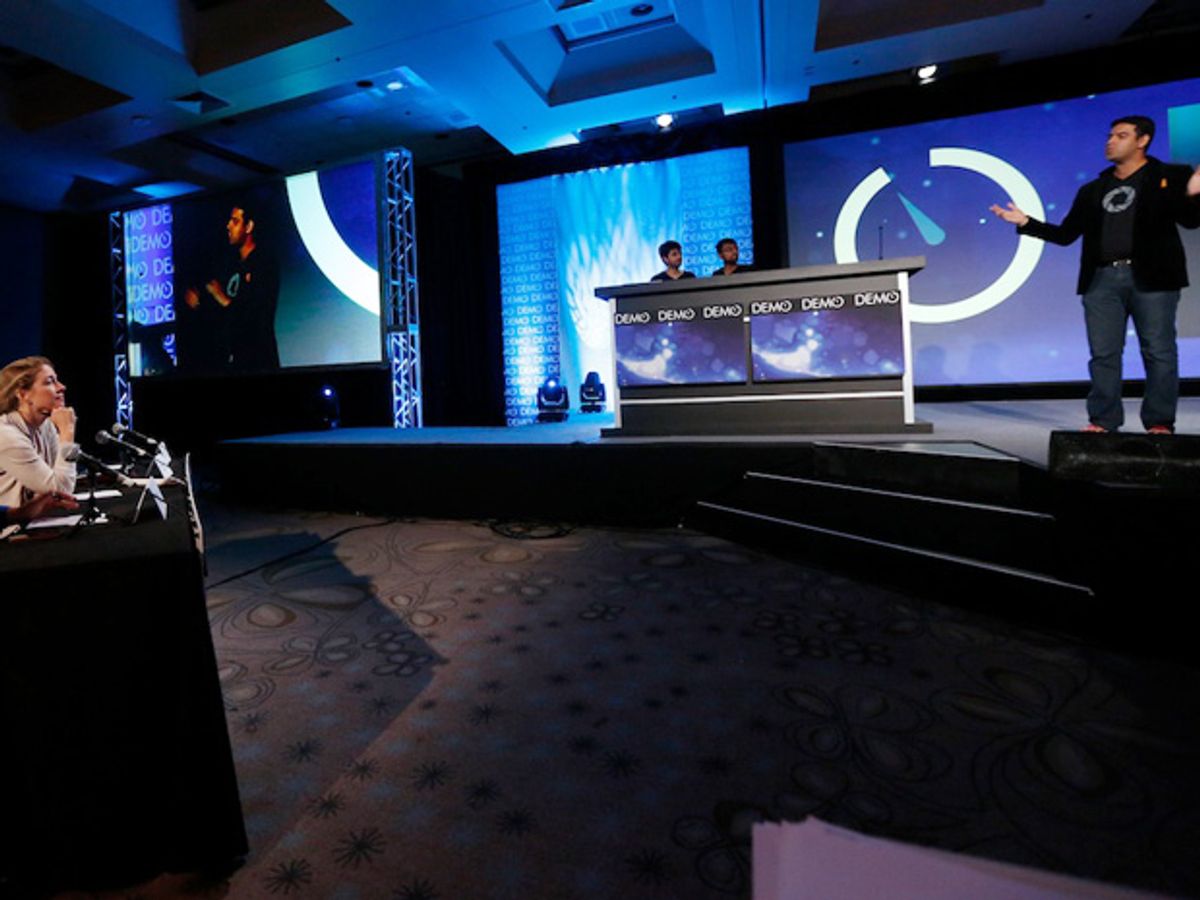“Sharing needs to happen without thinking, we believe that thinking is overrated,” said Sachin Dev Duggal, cofounder of Shoto, a San Francisco company introducing a mobile sharing app at DemoFall 2013, held last week in Santa Clara, Calif.
“In a world where everything is connected, there is no downtime, we are always working,” said Erick Schonfeld, executive producer of the Demo conference.
“Not having to talk to people is huge,” said Josh Elman, a venture capitalist with Greylock partners and one of the judges of Demo, touting the convenience of some mobile apps over real-world interaction.
I hadn’t been at DemoFall for more than an hour, and I was feeling an odd sense of déjà vu—not that I’d seen these speakers before, but that I’d read their words—in excerpts from the hot Silicon Valley novel, The Circle. And this was a little disturbing.
The Circle, by Dave Eggers, is the story of a recent college grad at some undefined time in the near future who starts working at a Silicon Valley company. The company, called The Circle, resembles a morphed Facebook and Google. It has just introduced an always-on video camera that captures and shares everything you see, here, or do. Corporate slogans include “All that happens must be known,” and “Secrets are lies, sharing is caring, privacy is theft.” I confess I haven’t read the entire book yet (it’s on my list), but I did read the lengthy excerpt in the New York Times Magazine and countless reviews and interviews. Some reviewers say the premise of TheCircle—of people sharing absolutely everything—is so unlikely as to make the book boring, others find the story creepy and frighteningly possible.
At Demo, the reaction to the Circle-like statements made from the podium was quick and harsh—at least according to the tweets of attendees, ironically. So maybe progress towards Circle-like future will be blocked by sheer distaste.
But a number of products introduced at Demo certainly made an ever-sharing world seem nearer-at-hand, for better or for worse. For example:
—Shoto: Though Shoto’s pitch for “sharing without thinking” was creepy, its product, an app for using proximity information to instantly share photos taken at an event with friends attending, had one awesome feature—you could go back later and zap away photos you later decided you’d rather not share, even if the photos had already been received by your friend’s phones. Who wouldn’t want a “do-over” button on any social network?
—Magisto: Magisto, based in New York City, takes videos and photos from a phone and edits them into a movie. You can select content to include, or it can automatically happen every time you shoot; the software figures out what content goes with the same event. Now, Magisto doesn’t require you to share the movie it creates, you can keep it all to yourself. But it does make creating and sharing a movie a lot easier. It’s appealing and simple enough that I plan to try the app, but I have to wonder if every moment of our life really should be thought of as a potential movie.
—Share: Share, an app from Los Angeles’ NewAer, creates instant clouds “over” people who are physically near each other. This way, any photos they take or other documents they create can easily go into the cloud for access by anybody else in the room; from the demo, it seemed like people are zapping files wirelessly back and forth with the people next to them, so you forget that the files are going into a cloud computer.
—EmoVu. EmoVu, from Eyeris, actually has nothing to do with sharing, but I could still see it in the world of The Circle. EmoVu analyzes facial expressions as people watch a video, the company calls that “looking back,” that is, the video is looking back at you. The company says it has algorithms for seven basic emotions (happy, sad, angry, etc), five metrics (like engagement and attention), and a general positive or negative mood state. EmoVu expects a big market in the advertising business, where the software could monitor responses to test ads. It’s not hard to imagine a more futuristic application--EmoVu used by folks in a room to check on the moods of those around them without looking up from their smart phones.
—Bedscales. To use Bedscales, a hardware and software package from GeneTrainer, you put sensor pads under each leg of your bed; the pads are wired to a transmitter that goes in the middle. The transmitter uploads information from the sensors about weight and movement, and the company combines that information with data from genetic testing to, it says, help you optimize your weight loss plan. GeneTrainer is developing algorithms to sort out individual data for people who don’t sleep alone. Admittedly, Bedscales only uploads your weight and sleep reports to the company’s website, where only you can see it; it’s not sharing your information on Facebook. (Yet.) Though I’ve stuck a toe in the quantified self waters (see my review of FitBit), I’m not quite ready to wire my bed.
Photo: The DEMO Conference
Tekla S. Perry is a senior editor at IEEE Spectrum. Based in Palo Alto, Calif., she's been covering the people, companies, and technology that make Silicon Valley a special place for more than 40 years. An IEEE member, she holds a bachelor's degree in journalism from Michigan State University.



